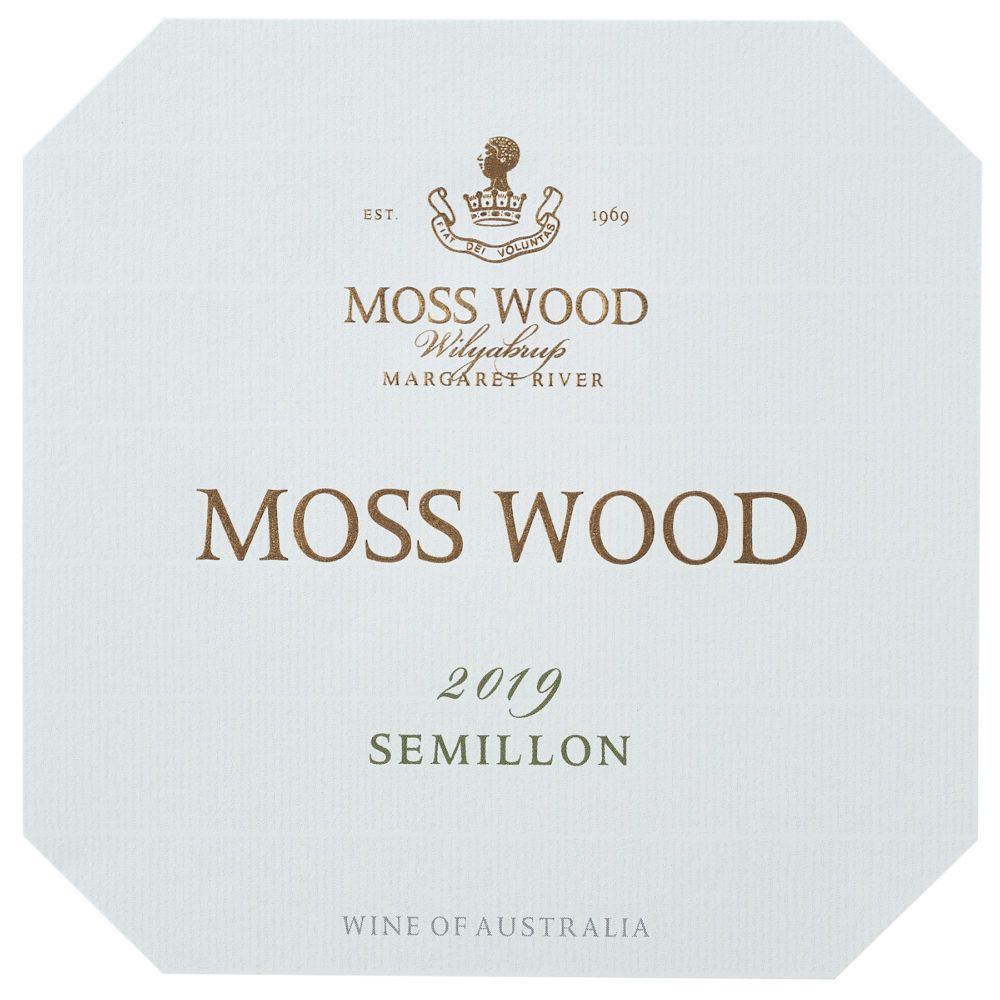Moss Wood 2019 Semillon

| Wine Facts | |
|---|---|
| Median Harvest Date | 28th March, 2019 |
| Harvest Ripeness | 13.1°Be |
| Yield | 3.25 t/ha |
| Weather Data | Growing Season Ave Temperature – 18.79⁰C Number of hours accrued between 18 and 28⁰C – 1158 Number of hours above 33⁰C – 6 |
| Day Elapsed between Flowering and Harvest | 121 days |
| Bottled | 12/07/2019 |
| Released | 30/08/2019 |
| Alcohol | 14% |
Wine Facts
-
Median Harvest Date
28th March, 2019
-
Harvest Ripeness
13.1°Be
-
Yield
3.25 t/ha
-
Weather Data
Growing season Ave Temperature - 18.79⁰C
Number of hours accrued between 18° and 28⁰C – 1158
Number of hours above 33⁰C – 6
-
Days Elapsed between Flowering and Harvest
121 days
-
Bottled
12th July, 2019
-
Released
30th August, 2019
-
Alcohol
14 %
Moss Wood 2019 Semillon – James Suckling, jamessuckling.com
This has quite a waxy nose with honey and chamomile aromas, as well as lemon blossom. The palate has rich, fuller body and some assertively ripe, pithy lemon and grapefruit flavors. Published April 2020
Moss Wood 2019 Semillon – James Halliday, Wine Companion
Pressed, the juice transferred to stainless steel tanks and settled for 48 hours, then racked and seeded with multiple yeast cultures and fermented at 18 degrees C, bottled as soon as possible in Jul. Smooth as silk with a velvet trim. It has multiple layers of fruit, and can silence…
Moss Wood 2019 Semillon – Bob Campbell, The Real Review
Rich, concentrated semillon with lemon zest, ginger, green apple and nutty yeast lees flavours. Youthful wine with plenty of cellaring potential. A serious semillon. Published 4th April, 2020
Moss Wood 2019 Semillon – Joe Czerwinski, The Wine Advocate Robert Parker
The medium-bodied 2019 Semillon features scents of tinned peas and citrus. With a chalky feel and green-apple notes on the finish, it should only improve for the next 4-5 years, then drink well for another 4-5 years after that, perhaps for even longer. The Semillon is picked relatively early…
Vintage Notes
Having spent much of this newsletter waxing lyrical about the 2017 and 2018 vintages, we now turn to the 2019 Semillon. From the outset, we at Moss Wood are immensely proud of this wine and its quality. However, technically-speaking, it is the most challenging of the 43 Semillons we have produced.
Initially, the season went quite well but as Spring progressed, the rain kept coming. Through the flowering period, which was just over a week behind the average, courtesy of cool, wet conditions, we had significant rain on 5 days, all interrupting the process. Even more difficult were the 9 days when the temperature dropped below 8°C and especially on 30th November, when it fell to 2.9°C.
The net result of all this delightful weather was a significant reduction in yield. The bunch weights were down by 36% to 109 grams per bunch. However, the fun didn’t end there.
Readers may be aware the Margaret River wine region can suffer significant losses from bird attack, especially silvereyes, although the problem is ameliorated when the Red Gums have a good flowering. This year the blossom was literally nonexistent and the silvereyes were starving. We use nets to keep the birds out and they are very effective, especially when they are only moderately hungry. Normally there is no need to cover all the vineyard and as long as we establish a perimeter of around 30 metres, the birds won’t fly over the nets to the unprotected crop. In 2019, just about every berry not protected by net was attacked. This also meant any sections where the nets may have been blown up by the wind, or where there were holes, the birds got in and created havoc. They even did their old trick of dive-bombing the nets and bouncing off in a desperate attempt to get to the fruit.
The damage to the Semillon was so bad, we nearly didn’t pick it. There remained some sound fruit and we had to weigh up the difficulty and cost of the process, given the degree of care required in picking and sorting. It was tedious and time consuming to say the least.
In a fine effort by the Shawkat and his team of Hazari pickers, assisted by the Moss Wood vintage crew, all the bunches were picked and meticulously sorted and all damaged fruit left on the ground. Even Clare and Keith got their hands dirty! Once delivered to the winery, the fruit was further selected to clean out the last of the damage and then it was whole-bunch pressed to extract the juice.
When we weighed all the sorted bins, we had the grand total of just over 5 tonnes of grapes giving a mighty yield of 3.25 tonnes per hectare, some 69% below average! There were wry smiles all round.
What must not be lost in this tale of woe was the fact the Summer had been delightful, with consistently mild temperatures and the Semillon had ripened beautifully, if somewhat slowly. In the end, it was harvested on 28th March, some 17 days later than usual but had reached 13.1° Baume, slightly ahead of its average of 12.7.
Production Notes
The pressed juice was transferred to stainless steel tank and settled for 48 hours, after which it was racked and seeded with multiple yeast cultures for primary fermentation, which was maintained at 18°C. Once completed, the finished wine was racked and fining trials carried out to determine if we could improve the tannin balance. In a tribute to the quality of the year, none of the agents improved the wine and it was treated only with bentonite for protein stability.
In keeping with our philosophy of bottling the Semillon as soon as possible to retain fruit freshness, it was sterile filtered and bottled on 12th July, 2019.
If, in the future, a member of the Moss Wood team is heard to be strident in their support for, or defence of, the 2019 Semillon, please humour them gently and keep in mind they are immensely proud of the wine and the effort that went into its production.
Tasting Notes
Colour and condition:
Pale straw hue; condition is bright.
Nose:
A very typical Moss Wood Semillon nose with fruit aromas of figs, honey and rock melon; there is a light background of green apple; almost nashi pear and cheddar cheese.
Palate:
The wine immediately presents as full-bodied with generous mouthfeel; the flavours of fig, pear, green apple and lemon sorbet sit over fresh acid giving good lift; there is length and persistence and the finish has the right amount of tannin to support long term cellaring.
Cellaring
As with all Moss Wood Semillons, the cellaring advice is quite straightforward. The wine currently drinks very well and can be enjoyed for its generous youthful fruit flavours. The bottle bouquet of toasty and buttery notes will take at least a decade to play a significant role and a further 10 years after that before they dominate. Therefore, we expect it to reach full maturity at around 25 years old and should maintain that for at least a further 10 years.
